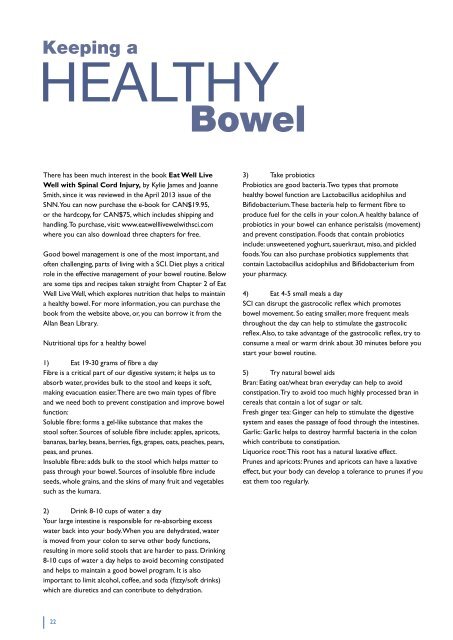SPINAL NETWORK NEWS
Create successful ePaper yourself
Turn your PDF publications into a flip-book with our unique Google optimized e-Paper software.
Keeping a<br />
HEALTHY<br />
Bowel<br />
There has been much interest in the book Eat Well Live<br />
Well with Spinal Cord Injury, by Kylie James and Joanne<br />
Smith, since it was reviewed in the April 2013 issue of the<br />
SNN. You can now purchase the e-book for CAN$19.95,<br />
or the hardcopy, for CAN$75, which includes shipping and<br />
handling. To purchase, visit: www.eatwelllivewelwithsci.com<br />
where you can also download three chapters for free.<br />
Good bowel management is one of the most important, and<br />
often challenging, parts of living with a SCI. Diet plays a critical<br />
role in the effective management of your bowel routine. Below<br />
are some tips and recipes taken straight from Chapter 2 of Eat<br />
Well Live Well, which explores nutrition that helps to maintain<br />
a healthy bowel. For more information, you can purchase the<br />
book from the website above, or, you can borrow it from the<br />
Allan Bean Library.<br />
Nutritional tips for a healthy bowel<br />
1) Eat 19-30 grams of fibre a day<br />
Fibre is a critical part of our digestive system; it helps us to<br />
absorb water, provides bulk to the stool and keeps it soft,<br />
making evacuation easier. There are two main types of fibre<br />
and we need both to prevent constipation and improve bowel<br />
function:<br />
Soluble fibre: forms a gel-like substance that makes the<br />
stool softer. Sources of soluble fibre include: apples, apricots,<br />
bananas, barley, beans, berries, figs, grapes, oats, peaches, pears,<br />
peas, and prunes.<br />
Insoluble fibre: adds bulk to the stool which helps matter to<br />
pass through your bowel. Sources of insoluble fibre include<br />
seeds, whole grains, and the skins of many fruit and vegetables<br />
such as the kumara.<br />
3) Take probiotics<br />
Probiotics are good bacteria. Two types that promote<br />
healthy bowel function are Lactobacillus acidophilus and<br />
Bifidobacterium. These bacteria help to ferment fibre to<br />
produce fuel for the cells in your colon. A healthy balance of<br />
probiotics in your bowel can enhance peristalsis (movement)<br />
and prevent constipation. Foods that contain probiotics<br />
include: unsweetened yoghurt, sauerkraut, miso, and pickled<br />
foods. You can also purchase probiotics supplements that<br />
contain Lactobacillus acidophilus and Bifidobacterium from<br />
your pharmacy.<br />
4) Eat 4-5 small meals a day<br />
SCI can disrupt the gastrocolic reflex which promotes<br />
bowel movement. So eating smaller, more frequent meals<br />
throughout the day can help to stimulate the gastrocolic<br />
reflex. Also, to take advantage of the gastrocolic reflex, try to<br />
consume a meal or warm drink about 30 minutes before you<br />
start your bowel routine.<br />
5) Try natural bowel aids<br />
Bran: Eating oat/wheat bran everyday can help to avoid<br />
constipation. Try to avoid too much highly processed bran in<br />
cereals that contain a lot of sugar or salt.<br />
Fresh ginger tea: Ginger can help to stimulate the digestive<br />
system and eases the passage of food through the intestines.<br />
Garlic: Garlic helps to destroy harmful bacteria in the colon<br />
which contribute to constipation.<br />
Liquorice root: This root has a natural laxative effect.<br />
Prunes and apricots: Prunes and apricots can have a laxative<br />
effect, but your body can develop a tolerance to prunes if you<br />
eat them too regularly.<br />
2) Drink 8-10 cups of water a day<br />
Your large intestine is responsible for re-absorbing excess<br />
water back into your body. When you are dehydrated, water<br />
is moved from your colon to serve other body functions,<br />
resulting in more solid stools that are harder to pass. Drinking<br />
8-10 cups of water a day helps to avoid becoming constipated<br />
and helps to maintain a good bowel program. It is also<br />
important to limit alcohol, coffee, and soda (fizzy/soft drinks)<br />
which are diuretics and can contribute to dehydration.<br />
22
















